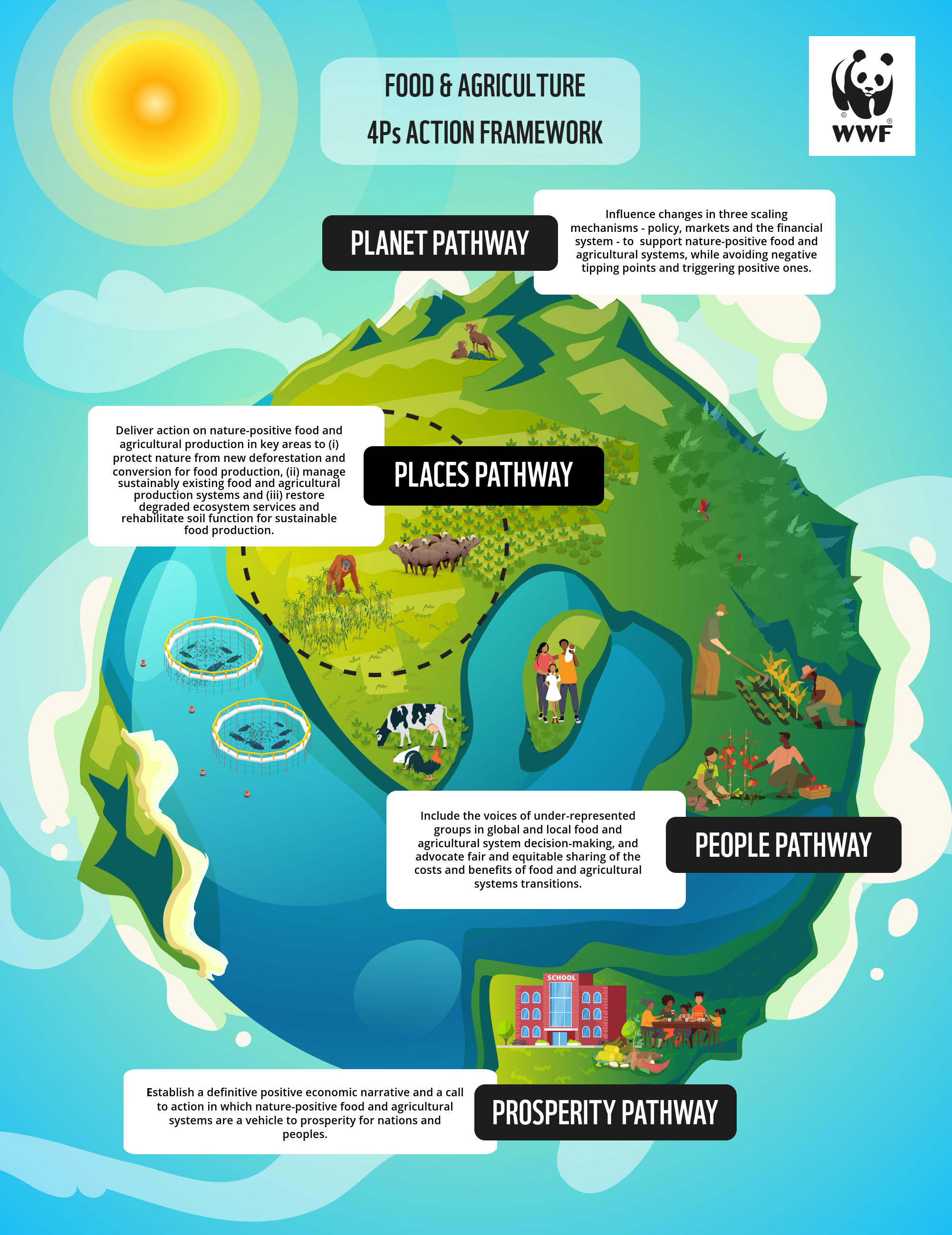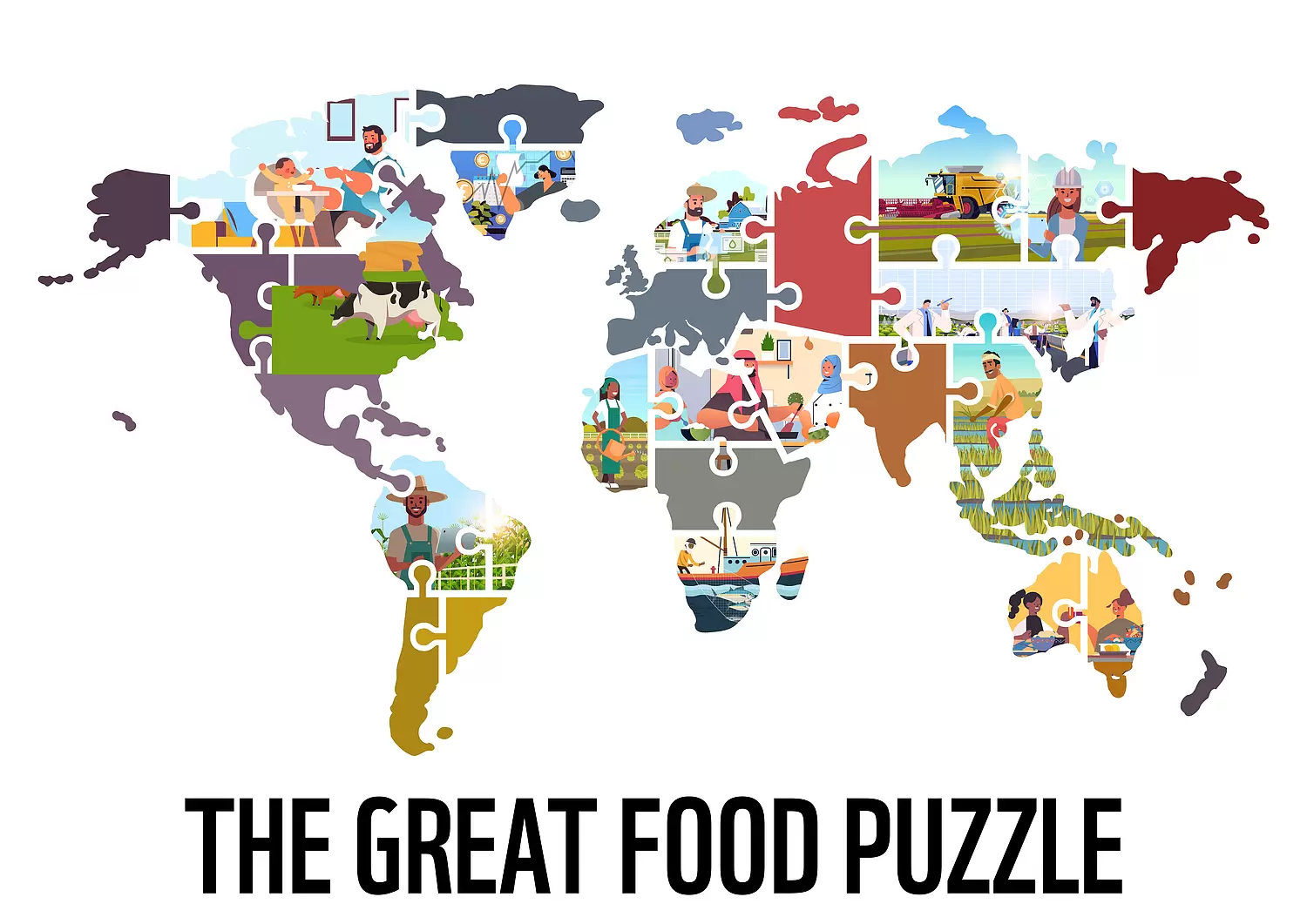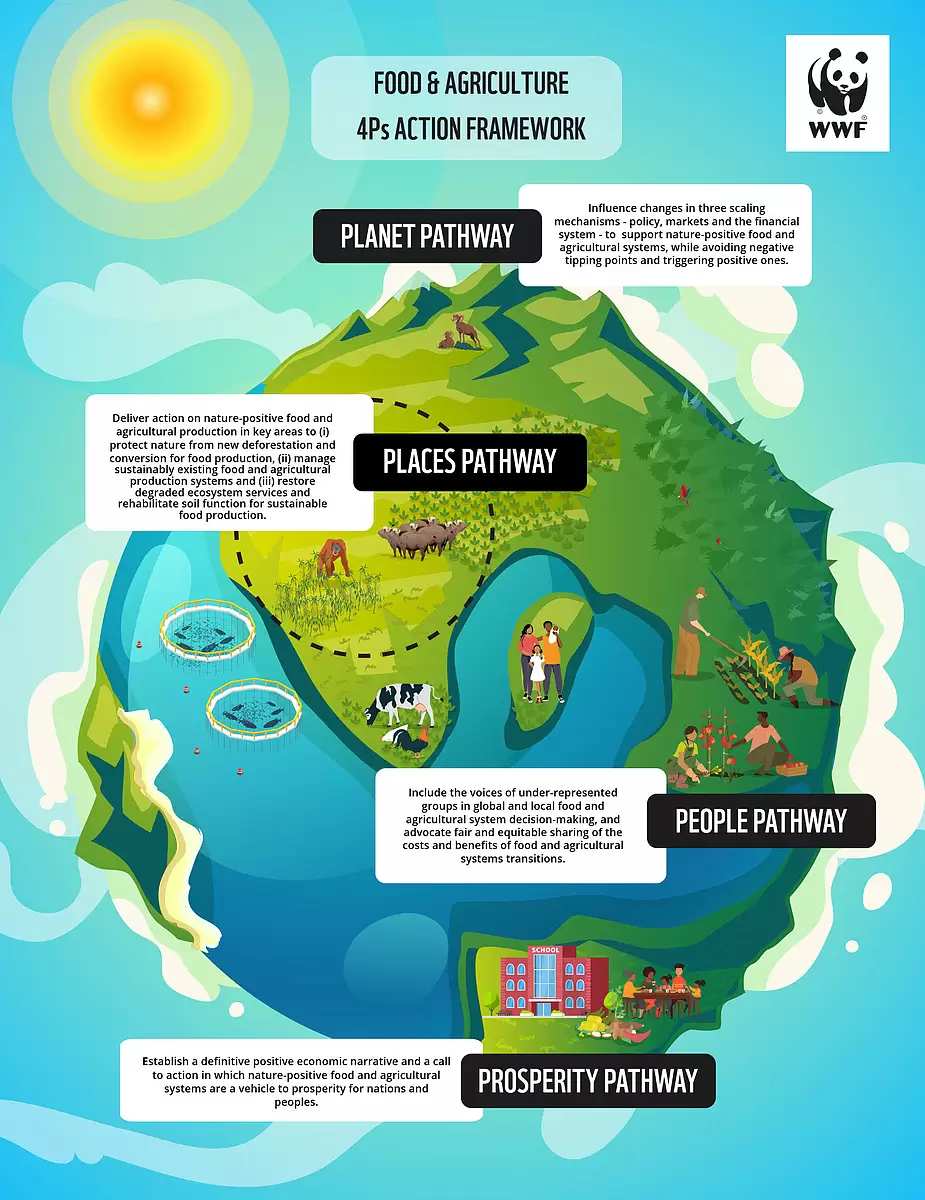The WWF is run at a local level by the following offices...
- WWF Global
- Adria
- Argentina
- Armenia
- AsiaPacific
- Australia
- Austria
- Azerbaijan
- Belgium
- Bhutan
- Bolivia
- Borneo
- Brazil
- Bulgaria
- Cambodia
- Cameroon
- Canada
- Caucasus
- Central African Republic
- Central America
- Central Asia
- Chile
- China
- Colombia
- Croatia
- Democratic Republic of the Congo
- Denmark
- Ecuador
- European Policy Office
- Finland
We all need to eat, but today’s food systems are failing. How we produce and consume food is the biggest driver of nature loss and a major cause of greenhouse gas emissions. Unhealthy diets are leaving billions obese, overweight or ill, but nearly 830 million are still going hungry. Huge amount of the food we produce is going uneaten - a waste of natural resources, human labour and money. Neither planet nor people are being nourished and these hidden costs are reducing food security and leaving food systems vulnerable to disruption.
Solving the great food puzzle of how to nourish everyone within planetary boundaries requires an integrated and systemic approach. The good news is that food systems can be a major part of the solution to the global health, climate and nature crises.
We work on multiple issues - including scaling nature-positive production practices, shifting to healthy and sustainable diets and radically reducing food loss and waste - and across value chains, in policy, finance, retail, on the farm and so on. We bring partners from across food systems together, at the global level to influence international agendas - like biodiversity loss, climate change and land use - and on the ground and in the water in more than 100 countries to implement context-specific and place-based solutions that will have the highest impact in the shortest time.

We work in nearly 100 countries to stop the degradation of the planet’s natural environment and to build a future in which people live in harmony with nature, by working with local communities and in some of the most iconic ecosystems. Applying a food systems approach is critical to deliver holistic benefits and we developed the 4Ps Action Framework, a new way of deliver actions on the ground for nature, climate and the wellbeing of people, to frame our work through four interconnected areas:
Planet – wherein planetary health is improved, with the impacts of food systems reduced, so that they operate within planetary boundaries (many of which are currently being transgressed)
Places – reducing the negative impacts, and increasing the positive ones, on landscapes, waterscapes and seascapes in which food is produced – protecting, sustainably managing and restoring these ecosystems to ensure that all ecosystem services (including food production) are optimized
People – raising the voices of under-represented groups, recognizing the critical role of Indigenous Peoples, local communities and women, leveraging the knowledge of these groups and ensuring there is a just and equitable sharing of costs and benefits of food and agricultural systems transformations
Prosperity – working towards food and agricultural systems transformation that improves livelihoods and incomes, ideally for all – but for those that may be negatively affected by transformations, ensuring that they are supported and incentivized to shift to more sustainable practices

Food intersects with most of the primary conservation issues. We work at the global level to shape agendas and ensure that food systems transformation is included as a solution to biodiversity loss, climate change and land-use change. We also focus on reshaping subsidies, incentives, taxes and investments, to shift away from encouraging harmful behaviours to rewarding healthy and sustainable practices.
Rapid decarbonization of all sectors is needed to achieve the Paris Agreement. Recent analyses have shown that climate action is not moving anywhere near quickly enough. Across all sectors, we need more urgency and a shift from making commitments to implementing solutions. Rapid action on food system transformation is especially critical given food systems produce around 33% of global greenhouse gas emissions but have historically been overlooked as a climate solution. We can’t phase out food in the same way we can fossil fuels, but we can transform food systems so that they have net-zero emissions. With systemic transformation, the food system can become a major part of the solution to the climate crisis.
LEARN MORE
LEARN MORE
Global targets for food systems transformation need to be downscaled to local contexts. Implementation will take place at the national and sub-national level. We take a food systems approach, working to scale nature-positive production, shift to healthier and more sustainable diets, and to eliminate food loss and waste. Our area-based conservation focuses on grasslands and savannahs, the ecosystems in which most food is produced - though they are often overlooked in conservation and transformation agendas.
LEARN MORE
LEARN MORE
LEARN MORE
LEARN MORE
NEW REPORT ON POLICY AND INVESTMENT PRIORITIES FOR GRASSLANDS AND SAVANNAHS
From Roots to Richers: Priority Policy and Investment Decisions for Grasslands and Savanahs shines a spotlight on these overlooked ecosystems. It comes at a pivotal moment, ahead of the International Year of Rangelands and Pastoralists and the UNCCD COP17 in Mongolia. The report offers a roadmap for protecting, managing and restoring grasslands and savannahs—helping governments, businesses and communities take action to safeguard their future.
The report provides policymakers with practical recommendations to integrate grasslands into climate and biodiversity frameworks, remove harmful subsidies, and support pastoralist and Indigenous land stewards. It also offers valuable guidance to the conservation community and the finance sector.

Collaborating to deliver nature-positive food and agricultural systems
World Food Day 2025 is calling for global collaboration in creating a peaceful, sustainable, prosperous, and food-secure future. Collaboration is at the heart of all we do in WWF, working with partners across food and agricultural systems to deliver just transitions that provide enough healthy and nutritious food while preserving nature from further conversion, degradation or overfishing and accelerating the implementation of nature-positive agriculture.

The 4Ps Action Framework: A new map to arrive at healthy and sustainable food and agricultural systems
The 4Ps Action Framework is the new way in which WWF will frame all our work in food and agricultural systems transformation. It brings together four critical areas that must be addressed for a just and equitable transition to healthy and nature-positive food and agricultural systems.
New reports, research, blogs and project updates.
GET CEREAL IN YOUR INBOX





